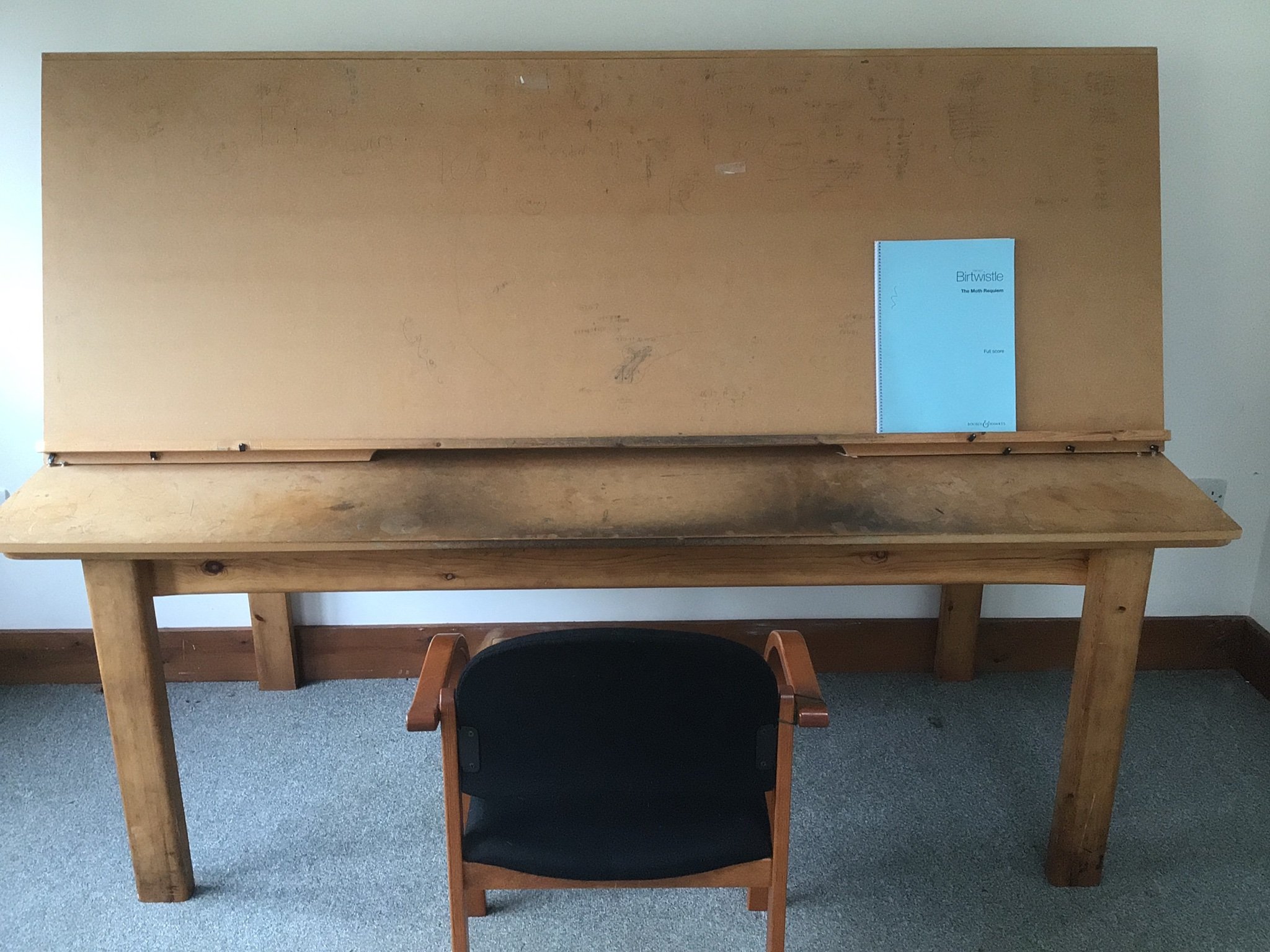On the Tropes of Being a Composer…
The death of the great Sir Harrison Birtwistle earlier this month was a seismic moment in British contemporary music, arguably the end of an era and a moment to assess the position new classical music holds in British cultural life. Birtwistle’s long creative life has rightly been lauded in all the right places with a genuine feeling that an individual and original voice had been lost and that it wasn’t instantly apparent where such voices might come from in the future. It doesn’t take much for the contemporary music machine to indulge in a period of navel-gazing, but maybe this was allowed following such a momentous departure. Amongst all the memorials, reminiscences and obituaries one photo caught my eye more than anything else, it was a picture of Birtwistle’s writing desk posted to Twitter by his son Silas without any comment. The picture (which you can see here) is stark: a simple desk, blackened by years of ink, adorned only by a carefully positioned score of the composer’s Moth Requiem, an entirely fitting choice for this austere farewell. What struck me about this was not only the painful silence of loss, but how this simple picture is what so many people imagine a composer’s workspace should look like – it is exactly what many would think Birtwistle’s writing environment would be. And that got me thinking – is this a trope of being a composer? And if so, what are the other tropes that might have permeated the popular conscious.
Many composers have a similar arrangement for their workspace, some whom I have met, some whom I have seen pictures of – there is nothing unusual there – a large desk with plenty of space and natural light makes complete sense. But many of today’s composers use computers with music-engraving software as their modus operandi, do they still use the Birtwistle model for their creative endeavours? Well, I think this is another trope, and one that is so engrained that it is hard to debunk (if you can debunk tropes…) – composers don’t like people to know they don’t use pencil and paper like the old masters. The notion that composers sketch like Bach, Beethoven, Britten and Birtwistle is so entrenched that it is hard to discredit – many do, of course, including those that use computers – but many simply write their music straight onto Sibelius or some other software. Surely there is no problem with this duality of notation? Maybe not, but I have always found a reluctance amongst composers to admit that they don’t use pencil and paper. Even I have been sheepish about my use of computers in the past, when asked I often reply, ‘I use both…whichever comes to hand first’. This is a lie, I only ever put my meanderings straight onto the software – I last used my sketchbook in 2007, but I can’t bring myself to give the whole truth. The trope is so engrained.
Two examples to reinforce this are such. When I was a PhD student, a leading composer came to the university to give a talk, during which they were very candid and said, ‘I write straight to Sibelius…and what’s more I use the MIDI playback sounds…I know I’m awful!’. There was an audible drawing of breath in the room – the trope had been challenged, the artifice had been smashed, Pandora’s Box had been opened! But the world didn’t end, composers still hide this predilection, and nothing changed. Secondly, I know of a composer who entirely writes using computer software but will copy the title and opening bars onto paper, just so they can photo it and post it to social media. The trope of the handwritten score is so strong that it has to be mimicked for true mass approval.
Another trope that is an extension of the Birtwistle photo is the Mahler hut – a hut/cabin/chalet in the woods, or up a mountain away from the hustle and bustle of real life. For full trope integrity, it probably is a hike away from civilisation, maybe doesn’t have amenities (other than a desk and a piano…the more battered the better) and there is a sort of monkish austerity about it that is good for creativity. Not all contemporary composers can have an Alpine retreat, but something similar in the garden just about fulfils the trope. As a counterbalance to this, let me indulge myself with a description of my current situation – I’m on a sabbatical, but rather than use my office (with is replete with desk, piano, books, stationary, lots of natural light) I’ve been working in our spare room, where I precariously balance my laptop on an electric keyboard whilst using a chest of drawers for a desk. I’m not wearing the hairshirt on this one, the room is at the back of the house and is the quietest, but the difference to the accepted trope is quite stark (when we have guests, I transfer my workstation to our walk-in-wardrobe…).
There are other tropes (or maybe these are something different?) – don’t use the aforementioned software playback (and if you do, only use piano sounds), don’t use your own works when teaching, don’t mention commission fees, don’t mention you’ve written something for free, don’t divulge you’ve got no work…the list goes on, and I think I do them all. But still, I have nothing against composers writing music however they choose, and I wonder if the younger generations will adhere to these tropes? Maybe they won’t, or maybe they too will accept this ongoing perception. Anyhow, I shall return to composing, in a bedroom in a youth hostel as it happens, with a keyboard with no F#s or Gs. I don’t imagine Birtwistle ever had that problem.
PAC
